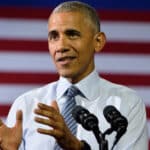





An opening ceremony drag parody at the 2024 Olympics has sparked a global controversy involving Christian leaders and U.S. politicians.
Fox News reported that the 2024 Olympics in Paris opened with a ceremony that included a drag performance parodying Leonardo da Vinci’s "The Last Supper," igniting international backlash.
This "artistic choice" quickly drew the ire of various religious and political figures worldwide, yet President Joe Biden and Vice President Kamala Harris have maintained silence on the matter.
Despite numerous leaders voicing their dismay, the offices of President Biden and Vice President Harris have not issued any statements. This silence is noted especially in contrast to First Lady Jill Biden's praise of the ceremony as "spectacular" during her visit to Paris.
The lack of comment from Biden, who is known for his Catholic faith, has raised eyebrows among constituents and leaders alike. Brian Burch, president of CatholicVote, publicly urged Biden to condemn the ceremony, highlighting the president's religious affiliation as a point of expected solidarity with the Christian community.
Further criticism came from House Speaker Mike Johnson, who took to X (formerly Twitter) to express his shock and describe the event as a direct attack on Christian values.
Johnson's statement echoed the sentiments of many, emphasizing a perceived ongoing battle against traditional faith-based values.
In addition to domestic responses, international political figures also voiced their disapproval. Italian Deputy Prime Minister Matteo Salvini criticized the choice of performance as a poor start to the Olympics, calling it "seedy" and an insult to Christians globally. Salvini’s comments highlighted the broader global discontent with the ceremony’s theme.
This collective disapproval showcases a significant rift between the cultural presentation at the Olympics and the expectations some have for such a unifying global event.
The incident has stirred up a discussion on the appropriateness of certain artistic expressions in international platforms like the Olympics.
The response—or lack thereof—from the U.S. leadership has further fueled the debate on the representation of religious beliefs in public and political arenas. Brian Burch’s statements underscore a frustration with what he perceives as a double standard in addressing religious mockery, suggesting a disparity in reaction if other religious groups were the subject of parody.
The criticism is not just limited to verbal rebukes but also questions about the role of leadership in addressing or acknowledging incidents that may alienate significant segments of the populace.
The ongoing silence by the Biden-Harris administration raises questions about the political calculus of such a stance. Observers note that addressing the controversy could be seen as a divisive move, yet not addressing it also risks alienating a large Christian demographic.
As the story continues to unfold, the reaction or non-reaction by prominent leaders may set a precedent for how similar issues are handled in the future, particularly in contexts as prominent as the Olympics.
The event and its fallout are indicative of the larger cultural and political divides, suggesting a complex landscape where religion, politics, and art intersect. This incident serves as a microcosm of the broader societal challenges facing leaders and communities today.
It also reflects on the dynamics of global events like the Olympics, which are often seen as platforms for not only sporting excellence but also cultural expressions and political statements.
The implications of this controversy are far-reaching, potentially influencing how future international ceremonies are planned and executed. The balance between artistic freedom and respect for diverse cultural sentiments remains a delicate one.
As global events continue to serve as stages for cultural dialogue, the decisions made by organizers and the reactions of global leaders will likely be scrutinized under an ever-intensifying microscope.
In conclusion, the 2024 Olympics opening ceremony has not only ignited a debate on artistic expression and religious sensitivity but has also tested the diplomatic waters in which global leaders navigate.
The reactions from various sectors highlight a deep-seated struggle with respecting religious diversity while fostering global unity.



